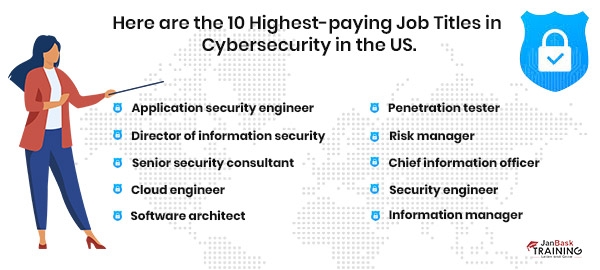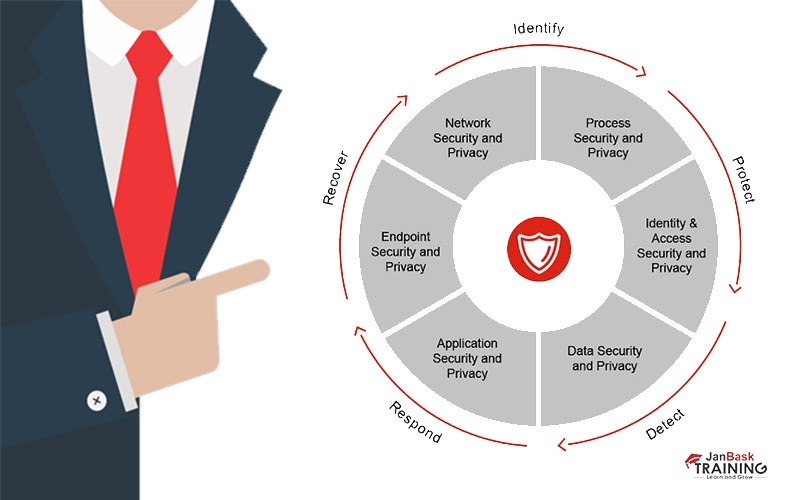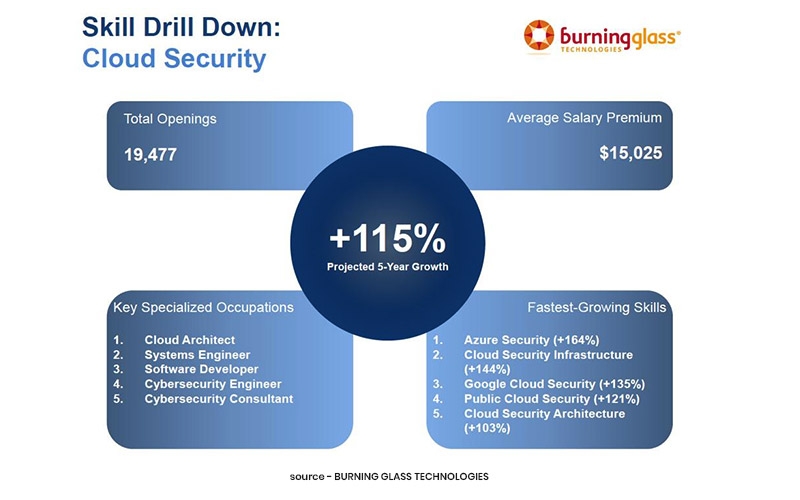Introduction
The world is digital, and with that comes a constant threat: cyberattacks. But here's the good news: this rising danger translates to a booming job market for cybersecurity professionals. Companies are scrambling to defend their data, creating a wealth of opportunities for those with the skills to fight back.
In this blog, we'll dive deep into everything cybersecurity careers have to offer. We'll explore why data protection is paramount, the specific skillset you'll need, and the exciting paths you can take in this ever-evolving field.
So, if you're looking for a career that's both challenging and rewarding, read on and discover why cybersecurity might be the perfect fit for you.
Facts About Cyber Security Job Growth
The cybersecurity landscape is exploding. A recent Gartner predicts a massive job market gap – a staggering 3.5 million unfilled cybersecurity positions by 2025. That's a 350% growth in open positions since 2013!
And the rewards are equally impressive. A simple Google search for "cybersecurity jobs $100,000" yields 1.7 million results. The average cybersecurity professional earns a healthy $130,000 annually. Major job boards like LinkedIn, Indeed, and Monster all boast tens of thousands of cybersecurity listings, with many exceeding the $100,000 mark.
Even tech giants like Google and Microsoft are heavily invested in cybersecurity, with Google having nearly 700 open positions on LinkedIn alone and Microsoft employing over 3,500 security experts globally.
Finally, the U.S. Bureau of Labor Statistics reinforces this trend, projecting a staggering 31% growth in cybersecurity jobs by 2029 – that's seven times faster than the national average!
The message is clear: cybersecurity is a thriving field with exceptional career potential. If you're seeking a challenging and lucrative path, this is the perfect time to explore cybersecurity careers.
Cyber Security Training & Certification
- Personalized Free Consultation
- Access to Our Learning Management System
- Access to Our Course Curriculum
- Be a Part of Our Free Demo Class
Why Cybersecurity Professionals Are In High Demand?
Cybercrime is a constant threat to organizations of all sizes, from corporations and government agencies to universities, social media platforms, and even your favorite restaurant chain. Here's a glimpse into the ever-growing impact:
- The Cost of Breaches: The average cost of a data breach has soared since 2019. According to recent studies, organizations can expect to pay an average of $4.24 million per breach [explodingtopics.com]. Healthcare remains the most targeted industry, with breaches costing an average of $10.1 million [ibm.com].
- Lucrative Opportunities: The demand for skilled cybersecurity professionals continues to outpace supply, leading to attractive salaries. While CISO salaries can vary based on location and experience, they remain highly competitive. You can expect an average salary of $260,000 in major tech hubs like San Francisco [comparably.com].
- Identity Theft on the Rise: Data breaches are a major source of identity theft. The latest reports indicate that millions of Americans fall victim each year, with losses exceeding $23 billion in 2023 [identitytheftresourcecenter.org].
- Massive Breaches Make Headlines: The Equifax breach of 2017 remains a stark example of the potential consequences. The final cost to the company is estimated to be well over $7 billion, impacting the lives of millions [wsj.com].
- Mobile Threats Evolving: The rise of malicious mobile apps continues. While Google Play blocks a significant number – estimates suggest over 30,000 per day in 2023 [statista.com] – these threats highlight the constant need for vigilance in the mobile landscape.
These are just a few examples of how cybercrime is impacting our world. If you're looking for a career that offers a chance to make a real difference and be well-compensated for your skills, then cybersecurity is an excellent choice.
Cybersecurity Expert: A Must-Have, Everywhere
With a cybersecurity career path, there is no dearth of cybersecurity jobs no experience, or with experience.
- Private industry: Companies of all types and sizes are paying top dollar for cybersecurity professionals with the right skills and experience. Great career for cybersecurity jobs for beginners.
- Law enforcement: Law enforcement to identity theft and other types of cybercrime have been looking for certified Cyber Security professionals.
- Media: Reporting on cybercrime, cybersecurity, and the cyber economy every media agency needs you.
- Government: From the U.S. Department of Homeland Security and nearly all other federal entities to state, county, and local agencies.
- Education: In addition to information security jobs at schools, colleges, and universities; more and more institutions are launching cybersecurity degree programs, creating new opportunities for academic instructors.
- Software development: With investment in developing cybersecurity tools and software, it’s playing an important part in the cybersecurity jobs landscape.
- Cybersecurity training: Since all organizations now need to train their employees to employ information security best practices, training firms are another potential avenue for job seekers.
- Consultants and freelancers: Immense opportunity for highly skilled consultants, freelancers such as penetration testers, bug bounty hunters, and other independent consultants.
- Cybersecurity insurance: Leading insurers are developing new products and policies, creating a need for tech-savvy insurance professionals.
- Managed Security Service Providers: MSSPs are especially helpful for organizations that have limited IT resources and lack internal security expertise, as well as for large enterprises looking to outsource specific functions.
Top US Companies Hiring Cybersecurity Professionals
Cybersecurity is a top priority for leading companies across industries. Here's a glimpse into how some are building strong security teams:
- Apple: Protecting user data is paramount. Apple is actively recruiting cybersecurity professionals to stay ahead of evolving threats.
- Intel: As the Internet of Things (IoT) expands, Intel needs experts to secure their new chips and devices.
- Federal Reserve Bank of New York: Financial institutions like the Fed require robust defenses. They actively seek talent to minimize system vulnerabilities and protect sensitive financial data.
- Patient First: Healthcare is a prime target for cyberattacks. Patient First is adding cybersecurity staff to combat ransomware and other threats.
- General Motors: Connected cars create new security challenges. GM is likely expanding their team to address these risks and ensure user safety.
- Capital One: Big data and emerging technologies require strong security practices. Capital One invests in cybersecurity professionals to safeguard their extensive financial data projects.
- Cisco: Recognizing the growing sophistication of cyberattacks, Cisco is bolstering its cybersecurity efforts. They're likely hiring additional staff to strengthen their security products and research initiatives.
- Lockheed Martin: A global leader in aerospace and security, Lockheed Martin offers a vast cybersecurity career path. Their work spans research, development, and integration of advanced technology systems, all requiring robust security measures.
This is just a sampling of the many companies at the forefront of cybersecurity. The demand for skilled professionals is high across various industries, offering exciting opportunities for those passionate about protecting our digital world.
Most In-Demand Cyber Security Job Titles
Cyber Security Job Titles

1. Information Security Analyst:
To analyse, monitor and examine security systems for organizations, and prevent potential security breaches is the key role of Information Security Analyst. They devise protective measures to safeguard the security infrastructures for businesses. Jobs available worldwide: 13,852+
2. Ethical Hacker:
Ethical hacking is licensed and legal hacking to check a company’s security strength. Ethical hackers find ways of breaking into security infrastructures to find system vulnerabilities and ways of improving those. Jobs available worldwide: 6,597+
3. Digital Forensic Analyst:
Digital forensic specializes in retrieving digital evidence from various devices used in cybercrimes. Recovering lost data or breached data and often helping law enforcement agencies to retrieve any significant information that can be used as evidence against cybercrimes is their key role. Jobs available worldwide: 1,575+
4. Security Architect
Designing, building, and maintaining the security infrastructures for any kind of information and data in a company is the job of a Security Architect. Security analysts try to gain unauthorized access to computer systems to identify areas of improvement and work on them, along with documenting the entire process to record the progress. Jobs available worldwide: 6,122+
5. Network Engineer
Network engineers work on designing and maintaining the digital network used by the hiring organization. Network engineers ensure that the network functions of the organization run smoothly. Jobs 5462+
6. Security Software Developer
Security software developers integrate reliable security practices while developing the software to ensure they are robust and effective. Jobs available worldwide: 2,575+
7. Chief Information Security Officer (CISo)
This is a senior-level position for security experts who oversee all kinds of data and information security activities for an organization. Depending on the company, the chief information security officer handles a number of responsibilities, including working directly with the management, the technical team, and of course, the cybersecurity team. Jobs 4677+
Responsibilities Of The Cyber Security Professional

New security threats pop up all the time, and IT security professionals need to stay up to date with the latest tactics hackers are employing in the field.
- Set and implement user access controls
- Implement comprehensive vulnerability management systems across all assets on-premises and in the cloud
- Identity and access management systems
- Monitor network and application performance
- Deploy detection and prevention tools to avoid malicious hacks
- Perform audits to ensure security practices are compliant
- Setup up management systems to update applications automatically
- Work with IT operations for setting up disaster recovery/business continuity plan
- Work with HR and lead teams to educate employees on how to identify suspicious activity
What Skillsets Are Required To Make A Career In Cybersecurity?

Technical Skills For Cyber Security Job Growth
- Security Incident Handling & Response
- SIEM Management
- Audit & Compliance
- Analytics & Intelligence
- Firewall/IDS/IPS Skills
- Intrusion Detection
- Application Security Development
- Advanced Malware Prevention
- Mobile Device Management
- Data Management Protection
- Digital Forensics
- Identity & Access Management
Soft Skills For Enhanced Cyber Security Career
- Leadership ability
- Passionate About Learning
- Determination to solve an issue
- Collaborative
- Analytical, Inquisitive, and Insightful
Cyber Security Professionals Salaries
 Let’s understand the salary part with respect to roles a cybersecurity professional grabs, cybersecurity job titles, and description :
Let’s understand the salary part with respect to roles a cybersecurity professional grabs, cybersecurity job titles, and description :
- Cybersecurity Engineer - The Cybersecurity Engineer position also nets one of the highest salaries in the security industry, with average cybersecurity salaries ranging between $120,000 to $200,000 per year.
- Application Security Engineer - Another one of the highest-paid cybersecurity jobs, Application Security Engineers, makes on average between $120,000 to $180,000 per year.
- Cybersecurity Analyst - The average cybersecurity salary for this position falls between $90,000 and $160,000 per year.
- Penetration Tester - Penetration Testers, commonly called Pen Testers or Ethical Hackers, on average, make between $80,000 to $130,000 per year.
- Network Security Engineer - Rounding out this list of the highest-paid cybersecurity jobs, the average salary for the Network Security Engineer role now ranges between $125,000 to $185,000 per year.
- Chief Information Security Officer (CISO) - While a few elite CISO may earn close to $500,000, many make just a little over $100,000,” according to the InfoSec Institute. Forbes.com reports that $420,000 is the upper end of the CISO salary spectrum in San Francisco.
- Lead Software Security Engineer - According to Cybersecurity Ventures, Lead Software Security's salary can exceed $225,000.
- Cybersecurity Sales Engineer - CSOonline.com reports that top cybersecurity sales engineers are paid annual salaries between $180,000 and $220,000 per year.
- Cybersecurity Architect - An information security or cybersecurity architect earns an average of $140,820, according to the InfoSec Institute, which describes the role as performing senior-level work designing an organization-wide network and computer security architecture.
Top Certifications In The Field Of Cybersecurity
The cybersecurity landscape offers a multitude of career paths. This roadmap will guide you through essential certifications to build your skillset and progress in your chosen field.
1. Foundational Knowledge:
- CompTIA Security+: This entry-level certification provides a solid understanding of core security concepts, a must-have for any aspiring cybersecurity professional.
2. Choosing Your Specialty:
Once you have a foundation, explore your interests and choose a specialization. Here are some popular options with key certifications:
- Penetration Testing:
- Certified Ethical Hacker (CEH): Learn how attackers think and exploit security vulnerabilities ethically.
- Offensive Security Certified Professional (OSCP): Gain hands-on experience with penetration testing tools and techniques (highly regarded in the industry).
- Security Management:
- Certified Information Systems Security Professional (CISSP): A broad-based certification demonstrating a comprehensive understanding of cybersecurity principles. (CISSP is often a hiring requirement for senior security roles)
- Certified Information Security Manager (CISM): Focuses on security management best practices and prepares you for leadership positions like Chief Information Security Officer (CISO).
- Cloud Security:
- Certified Cloud Security Professional (CCSP): Develop expertise in securing cloud environments.
- Network Security:
- Cisco Certified Network Associate (CCNA) Security: Gain core network security skills for entry-level security positions.
3. Advanced Specializations (Optional):
For experienced professionals seeking deeper expertise, consider these advanced certifications:
- GIAC Security Expert (GSE): The pinnacle of information security certifications, demonstrating exceptional knowledge and experience.
- GIAC Security Leadership Certification (GSLC): Ideal for security professionals transitioning to leadership roles.
- Computer Hacking Forensic Investigator (CHFI): Master the skills needed for digital forensics investigations.
Remember:
- This roadmap is a general guide, and the best path may vary depending on your experience and career goals.
- Research specific job descriptions to see which certifications are in demand within your desired field.
- Continuous learning is essential in cybersecurity. Stay updated on the latest threats and technologies.
By following these steps and continuously honing your skills, you can build a successful and rewarding career in cybersecurity.
Can I Apply For a Cyber Security Certification Course?
This comprehensive course is designed for anyone interested in learning the fundamentals of cybersecurity, regardless of background. Whether you're an IT professional, law enforcement officer, financial expert, or simply looking to stay secure online, this course will equip you with the knowledge you need.
No prior experience is required!
The course covers essential topics without diving into complex coding. However, a basic understanding of networking concepts, Linux/Unix operating systems, and wireless technologies can be beneficial.
Who should take this course?
- IT Professionals (Managers, System admins, Network Engineers, etc.)
- Security Professionals
- Law Enforcement Officers
- Government Agencies
- Finance & Insurance Professionals
- Banking Professionals
- Anyone interested in cybersecurity
Boost Your Career or Personal Security - Enroll Today!
This remote learning course allows you to learn at your own pace, from the comfort of your home. Don't miss this opportunity to gain a valuable edge in today's digital world.
Where To Get Cyber Security Certifications
When looking for the right institution to pursue the course, focus on the following points:
- Industry experts imparting the training program
- Detailed course structure covering every minute detail
- The course structure is flexible and suits your schedule
- Industry exposure and real-time scenarios are been provided
- Proper and handy course material
- Forum to discuss and enhance your knowledge
- Post course completion job assistance and counseling program
- Course cost should be competitive with flexible payment options
Tips To Get Hefty Paychecks As Cyber Security Professional
The good news? A career in cybersecurity offers excellent earning potential. Here are effective strategies to maximize your salary, whether you're new to the field or a seasoned professional:
- Earn Cybersecurity Certifications: Certifications validate your skills and knowledge, leading to a potential salary increase of 5% to 25%. Explore certifications like Certified Ethical Hacker (CEH) or Certified Information Systems Security Professional (CISSP) depending on your chosen specialization.
- Target In-Demand Skills: Stay ahead of the curve by focusing on areas experiencing high demand. Cloud security, web application security, threat intelligence, and security software development are all hot skills that can significantly impact your earning potential.
- Choose a Lucrative Industry: Cybersecurity professionals are in high demand across various sectors. Healthcare, finance, and retail offer particularly strong potential for high-paying opportunities.
- Find the Right Cybersecurity Role: Early in your career, consider roles that align with your salary goals. Cybersecurity offers diverse options, each with its own earning range. Some of the highest-paying jobs include security engineers, application security engineers, directors of information security, and cloud engineers (average salaries listed).
- Target Top-Paying Companies: Compensation can vary significantly between companies. Research salary data to identify large corporations (Fortune 500) that typically offer higher compensation packages compared to smaller businesses.
- Location, Location, Location: Cybersecurity salaries can vary geographically. Major cities like Minneapolis, Seattle, and San Francisco generally offer higher salaries compared to rural areas.
Remember, continuous learning is key. Stay updated on the latest threats and technologies to maintain a competitive edge in the cybersecurity job market. By implementing these strategies and honing your skills, you can achieve a successful and lucrative career in cybersecurity. Here are the top ten highest-paying cybersecurity jobs (besides CIOs), according to Indeed.
- Application security engineer: $141,038
- Director of information security: $127,855
- Senior security consultant: $126,628
- Cloud engineer: $126,365
- Software architect: $138,167
- Penetration tester: $120,921
- Risk manager: $117,355
- Chief information officer: $126,419
- Security engineer: $101,808
- Information manager: $99,930
Conclusion
The world of cybersecurity comes with tremendous opportunities. Every organization is looking for skilled cybersecurity professionals amid constantly rising cyber-attacks. For cybersecurity career professionals in cybersecurity should strive to get certifications to gain credibility and prove their worth. The Bureau of Labor Statistics predicts a 28% increase in the demand for information security analysts between 2016 and 2026—that's an increase of 28,500 jobs. With demand for cybersecurity professionals at an all-time high, positions are available in virtually every industry. We are here to help you with more details over cybersecurity career path, cybersecurity jobs no experience, cybersecurity career roadmap.
FAQ
Q1. How do I enroll in a cybersecurity certification course?
Ready to take the next step? Simply visit the Cybersecurity course page and fill out your details. Our experts will be happy to guide you through the enrollment process and recommend the best course for your needs.
Q2. Which cybersecurity certification is right for me?
Choosing the right certification depends on your experience level and career goals. Here's a quick breakdown of some popular options:
Q3. Will cybersecurity certification land me a job?
Absolutely! Cybersecurity certifications validate your skills and knowledge, making you a more attractive candidate to employers. While certifications alone may not guarantee a job, they can significantly increase your earning potential and open doors to exciting opportunities across various industries. Top companies like Infosys, SAP, E&Y, Visa, and more actively seek qualified cybersecurity professionals.
Q4. How can I enter the cybersecurity field?
There are several paths to a cybersecurity career:
- Education: A relevant college degree in computer science, information technology, or cybersecurity can provide a strong foundation. Look for programs that cover topics like information security, network security, and penetration testing.
- Experience: Existing IT experience can be a valuable asset. If you're already working in IT, consider transitioning to cybersecurity by taking relevant courses and certifications.
- Certifications: While not mandatory, cybersecurity certifications demonstrate your commitment to the field and can significantly enhance your resume.
- Explore Diverse Roles: Cybersecurity offers a wide range of career options beyond security analysts and ethical hackers. Consider roles like database administrator, system administrator, network engineer, or security architect.
Remember, continuous learning is crucial in cybersecurity. Stay updated on the latest threats and technologies to thrive in this ever-evolving field.
Trending Courses
Cyber Security
- Introduction to cybersecurity
- Cryptography and Secure Communication
- Cloud Computing Architectural Framework
- Security Architectures and Models
Upcoming Class
8 days 12 Jul 2025
QA
- Introduction and Software Testing
- Software Test Life Cycle
- Automation Testing and API Testing
- Selenium framework development using Testing
Upcoming Class
-0 day 04 Jul 2025
Salesforce
- Salesforce Configuration Introduction
- Security & Automation Process
- Sales & Service Cloud
- Apex Programming, SOQL & SOSL
Upcoming Class
8 days 12 Jul 2025
Business Analyst
- BA & Stakeholders Overview
- BPMN, Requirement Elicitation
- BA Tools & Design Documents
- Enterprise Analysis, Agile & Scrum
Upcoming Class
7 days 11 Jul 2025
MS SQL Server
- Introduction & Database Query
- Programming, Indexes & System Functions
- SSIS Package Development Procedures
- SSRS Report Design
Upcoming Class
7 days 11 Jul 2025
Data Science
- Data Science Introduction
- Hadoop and Spark Overview
- Python & Intro to R Programming
- Machine Learning
Upcoming Class
-0 day 04 Jul 2025
DevOps
- Intro to DevOps
- GIT and Maven
- Jenkins & Ansible
- Docker and Cloud Computing
Upcoming Class
6 days 10 Jul 2025
Hadoop
- Architecture, HDFS & MapReduce
- Unix Shell & Apache Pig Installation
- HIVE Installation & User-Defined Functions
- SQOOP & Hbase Installation
Upcoming Class
-0 day 04 Jul 2025
Python
- Features of Python
- Python Editors and IDEs
- Data types and Variables
- Python File Operation
Upcoming Class
15 days 19 Jul 2025
Artificial Intelligence
- Components of AI
- Categories of Machine Learning
- Recurrent Neural Networks
- Recurrent Neural Networks
Upcoming Class
14 days 18 Jul 2025
Machine Learning
- Introduction to Machine Learning & Python
- Machine Learning: Supervised Learning
- Machine Learning: Unsupervised Learning
Upcoming Class
21 days 25 Jul 2025
Tableau
- Introduction to Tableau Desktop
- Data Transformation Methods
- Configuring tableau server
- Integration with R & Hadoop
Upcoming Class
1 day 05 Jul 2025






 Let’s understand the salary part with respect to roles a cybersecurity professional grabs, cybersecurity job titles, and description :
Let’s understand the salary part with respect to roles a cybersecurity professional grabs, cybersecurity job titles, and description :

















![Top 20+ Cyber Security Project Ideas & Topics For Freshers & Experienced [2025] image](https://assets.janbasktraining.com/blog/uploads/images/Cyber_Security_Projects_1.webp)


Ricky
Hi, your blog information is helpful but I still wanted to know when is the next batch for the certification course starting?
JanbaskTraining
Glad you found this useful! For more such insights on your favourite topics, do check out JanBask Training Blogs and keep learning with us!
Sania
Can anyone help me in knowing which cyber security certification will help me advance in my current role?
JanbaskTraining
Hi, Thank you for reaching out to us with your query. Drop us your email id here and we will get back to you shortly!
Mia Jones
Can you give me some tips for clearing the exam ? Can you share some links for articles and videos?
JanbaskTraining
Thank you so much for your comment, we appreciate your time. Keep coming back for more such informative insights. Cheers :)
Emilio Davis
Hi, very informative blog! But I am curious to know whether I can enroll in the course as I have just completed my graduation.
JanbaskTraining
Glad you found this useful! For more such insights on your favourite topics, do check out JanBask Training Blogs and keep learning with us!
Nick Jones
I am a student of your institute, I am pursuing a Cyber security career here. I just wanted to know will get job assistance post completion of my course?
JanbaskTraining
Hello, JanBask Training offers online training to nurture your skills and make you ready for an amazing career run. Please write to us in detail at help@janbasktraining.com. Thanks!
Caden Thomas
Hey, Can anybody share some sample questions that can help me crack the exam.
JanbaskTraining
Glad you found this useful! For more such insights on your favourite topics, do check out JanBask Training Blogs and keep learning with us!
Holden White
Can your team help me knowing whether a cyber security career is the best choice for me or not.
JanbaskTraining
Thank you so much for your comment, we appreciate your time. Keep coming back for more such informative insights. Cheers :)